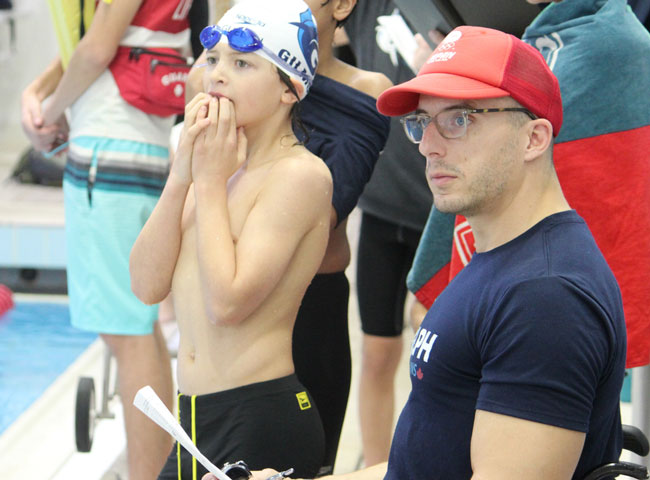Hendrik van der Merwe
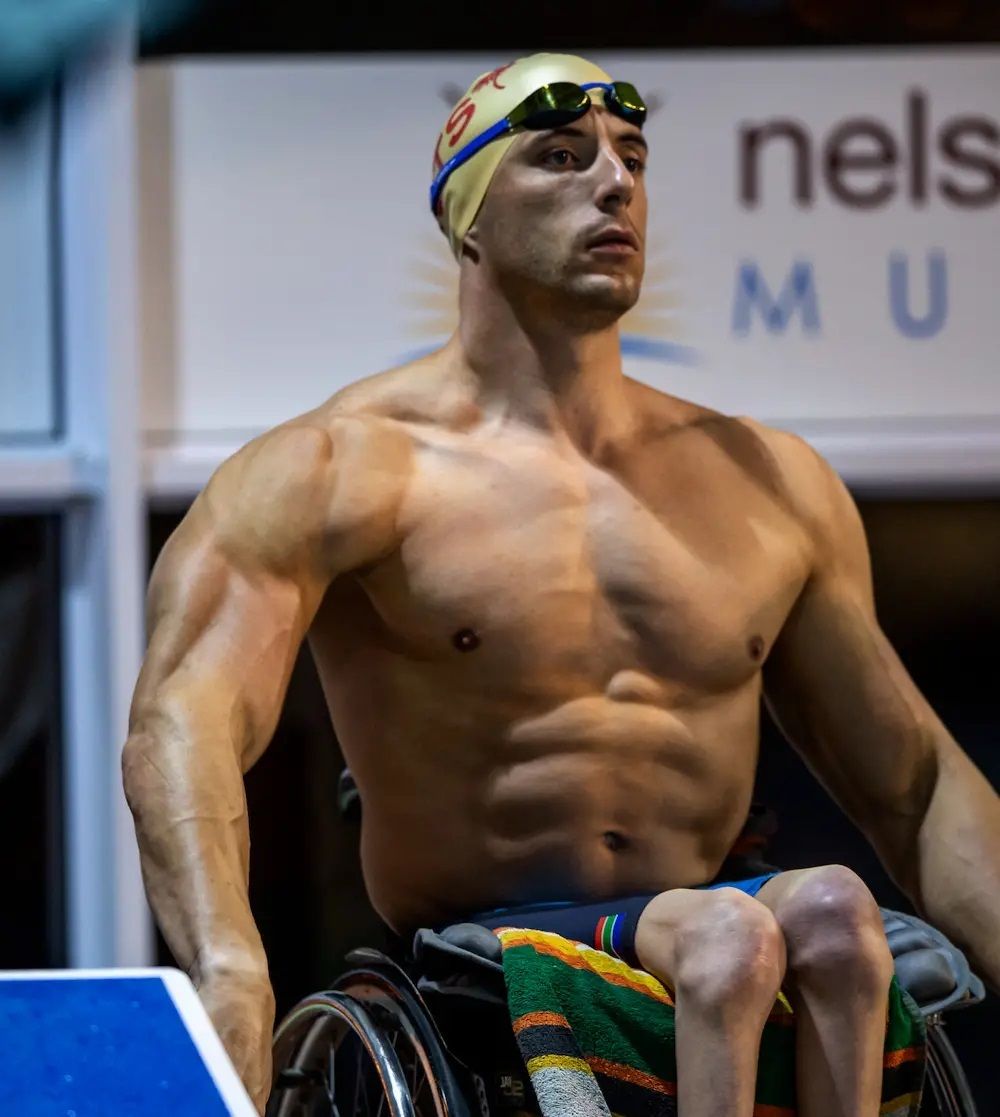
Hendrik van der Merwe's journey of highs and lows finally takes him to the Tokyo 2020 Paralympics
25 August 2021
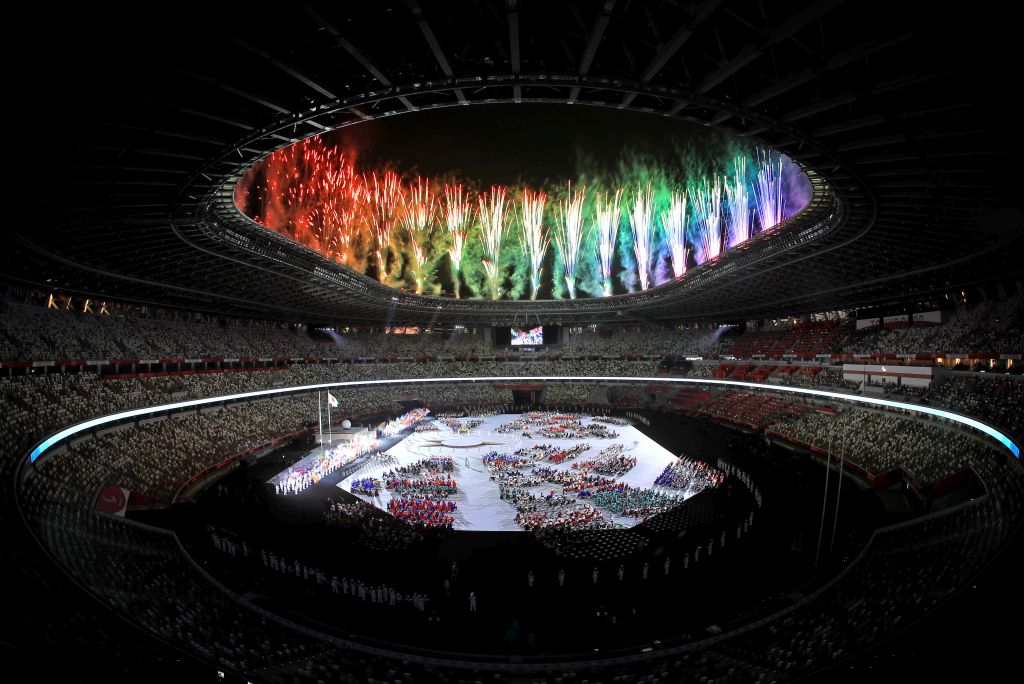
As he walked about the Olympic Stadium during the Tokyo 2020 Paralympics opening ceremony held under a full moon on Tuesday night, Hendrik van der Merwe would have been forgiven had he stopped, looked about and taken a moment for himself.
It has taken him 17 years of trying for the man they call “Legs” to get to the Paralympics, a journey of highs and lows that has tested him, and forced him into retirement from competitive swimming after he did not make the 2016 Games. He needed to make a living, he said, and he went into coaching. But he wanted one more shot at the sport he had taken up at school in 2004.
Van der Merwe, who was born with spina bifida and cannot use his legs, will take part in the 100m breaststroke heats on Saturday morning, an event in which his long-time rival Tadhg Slattery has two gold medals, two silvers and a bronze from his six Paralympics. Slattery is in Tokyo as a personal coach, having retired after the London Games. He made his debut in Barcelona in 1992, where he won gold.
Slattery retired as a Paralympic athlete a few times, and joked this week that Van der Merwe had asked him to stay on for one more chance to race against him. “We have been rivals for long time, until I retired,” said Slattery. “He was trying to beat me. He asked me to stay for one more race. I said to him, ‘No thank you’.
“Hendrik missed out three times on the Paralympics during past 17 years. On his fourth time he finally qualified for the Games this year. In 2008, I was in, he was out; 2012 me in, him out; 2016 he missed out again but now, in 2020, he is in. I could not be happier for him.”
For Van der Merwe “it feels like a weight has been lifted off my shoulders”. Van der Merwe, who is a strength and fitness coach, was in 2017 shortlisted in the top 10 for the Men’s Health magazine cover model. “Trying to make the Paralympic team has been a 17-year journey of highs and lows, but both the highs and the lows were essential in developing me into the athlete physically and mentally that I am today.”
He is one of a small swimming team of just four. Retirements and time have seen some of SA’s biggest stars retire and the code, once regarded as a trove of medals thanks to the likes of Natalie du Toit and Kevin Paul, is looking to Van der Merwe, Christian Sadie, Alani Ferreira and Kat Swanepoel to add to the pile.
Slattery has hinted that Sadie is the one to watch in the five events he has entered: 50m butterfly, 100m breaststroke, 200m individual medley, 100m backstroke and 50m freestyle. Born with radial dysplasia, which is also called “radial club hand”, the bones in his arms are underdeveloped. He did to want to be a Paralympian when he was younger, he confesses.
“I always did Para sports from a young age. There’s a different mentality, everyone would get a medal. I didn’t enjoy that because I’m very competitive. You get taught to be disabled in a way. I didn’t see myself as disabled. A lot of people think you need help and you don’t really need help. And that sort of put me off Para sports.”
Ferreira will be the first South African in the water, on Wednesday in the 100m butterfly heats, before she returns on Friday for the 400m freestyle.
Van der Merwe will have to wait a few more days before he makes his Paralympic debut. On Tuesday, he watched an opening ceremony that celebrated disability and hoped, again, to provide a basis for enhancing the lives and awareness of the differently abled. It is a very different Games in a very different time. Outside the stadium, protesters called for the cancelling of the Paralympics and the New Zealand team did not parade due to Covid-19 worries. There is reason to fear and be uncertain.
Van der Merwe has gone through fear and uncertainty. He waited 17 years for this. He won’t mind waiting a few more days.
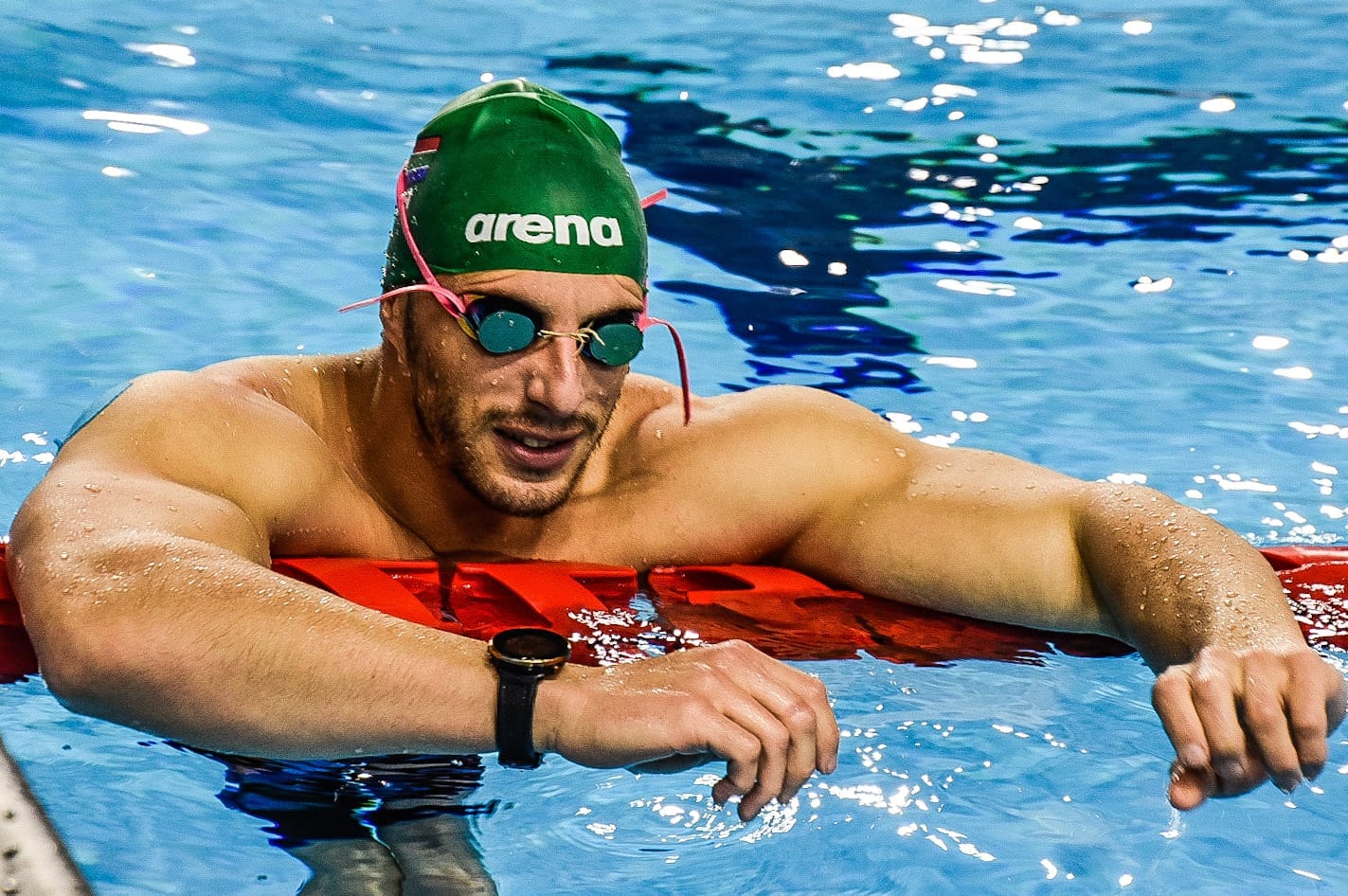
Meet the Coaches – Hendrik ven der Merwe
Introduction
As a parent of two sports sons, I know just how important a coach is in the life of a child. They are the experts in their particular sports fields. They guide, teach, advise, and correct our children in their passion for a sport. Many times these coaches fade and blend into the background as the focus goes onto the achievements of an athlete who does well in his or her sports.
But with this new series called “Meet the Coaches” I want to bring our coaches back into the front line. I want to say: coaches you matter, you make a difference and you are sent by God to guide and lead our children in their sports paths. I want to thank and celebrate our coaches for their long, hard hours and passion in teaching and training our children not only in sports skills but also in important life skills.
Today I am talking to Coach Hendrik van der Merwe. A great Olympian, true athlete, and a man who does not shy away from long hours and hard work. One who personally knows the “grind”, with a deep passion and dedication to see his young athletes that he coaches progress to the top.
Read on to find out more about this special coach!
Your nick name is Coach Legs – tell me a little bit about that?
The nickname Legs comes from one of my very first swimming tours. At a SA Schools Champs to Durban I made friends with two girls on the swim team, they gave me the nickname of Legs. Ever since the name just stuck, with family, friends and colleagues. I guess it is because people are comfortable with me, due to the fact that I am always making jokes about my disability. There is no time in life to look down on yourself.
How did you get involved in swim coaching?
Swimming is my life, I was forced to give up my own swimming career, because bills need to be paid and I do not get the time during the day anymore to train like a professional, of course me being me, I do not like doing things half. None the less I love my job as a Coach. I get to be involved in the sport still, the swim team gets to inspire one another, I get to produce quality swimmers, and I absolutely live for that indescribable goose bumps feeling that sport gives one, it is simply amazing. Swimming is a way of life and one will never survive in this sport unless you as an individual is driven by passion.
How long have you been coaching?
I have been coaching now for + – 3years.
What do you think are the top 1 or 2 characteristics of a good coach?
It will be difficult to name only two characteristics although two very important characteristics would be: Sharing a common love with your swimmers, and for you and the team to have the same visions moving forward.
What is your favorite part about coaching?
Showing the swimmers that they are capable of so much more. Creating stronger more confident swimmers. What we apply in the pool can also be applied in our day to day lives.
At this moment – what are you working on with your swim team?
Currently we are just working towards a successful year, although most of it being achieving more goals and improvements in training. After all, if one wants to race passionately, one must train passionately.
If you have to sum it up shortly, what is your number one aim as a coach for now and for the future?
Producing Olympic Athletes, and becoming one of the world’s greatest.
Are your all work and no play with your swim squad?
I am all about hard work, but it is important to play hard as well. Then again content vs context means everything.
If you could change a rule in swimming, what would it be?
Allowing more dolphin kicks on the breaststroke start.
Besides your professional work as a coach – what do you have a passion for?
I have a passion for keeping fit, and I have a strong liking to the pit bull dog breed.
Name the best moment of your coaching career so far?
Every day of coaching will have a minimum of one or two good moments.
Tell me about what you like to do to relax?
After a long week of coaching and working out, I do absolutely nothing and just plain enjoy being lazy.
You are an Olympian who participated in the 2012 London Paralympics Games. When you swam for you country, what did it feel like?
Swimming for my country gave me a good feeling and sense of achievement. It was a very proud moment for me competing in various IPC world championship events.
What word of motivation do you have for young athletes?
Train as perfect as possible, focus on doing the small things right. Always have long term success in mind when working towards a goal. Without passion nothing is attainable.
What is your favourite motivational quote?
”If the only prayer you say in your life is thank you, that would suffice. Perseverance, Gratitude, Blessed life.
Watch him on YouTube – https://www.youtube.com/watch?v=bz1-KRaHkPg
2024 National Coaches Week Feature
September 19, 2024
Hendrik van der Merwe
Hendrik van der Merwe is a winner.
Yet, you won’t see him as a pompous individual or parading around with a splash of medals and bragging about awards.
Let that sink in.
The 34-year-old, who was born in South Africa, has competed in several International Paralympic Committee World swim championships – even stopping in Montreal in 2013, where his best race was a seventh-place finish. That was in the 100-metres breaststroke SB5.
SB5 is a classification used for categorizing swimmers based on their level of disability.
In his situation, van der Merwe was born with a disorder which may have involved nerve damage, or weakness, resulting in paralysis of his legs.
You may have heard medical professionals refer to that disability as spina bifida - or the incomplete development of the spine.
His background is interesting. Living on a farm, he started to learn to swim at age nine. Four years later, van der Merwe made the decision to enter the competitive side of the sport. There was indelible and authentic proof of his success as an ambitious and competitive swimmer.
At age 15, his first international award happened in Sheffield, England – a bronze medal in the 100-metres breaststroke. Life, though, was a challenge for him - and not just due to his disability.
Starting at age four, and for eight years, van der Merwe attended a boarding school. He didn’t like study time and claims there was “always lots of violence” with students. It really got on his nerves. One way of dealing with that anxiety and stress was to turn to swimming.
For able-bodied swimmers, times are easier. For him, it meant more work, a new level of determination and a gut-wrenching eagerness to excel. Getting better in everything was his mandate. At one time, he maneuvered with the aid of braces. Now, he goes about his day-to-day duties in a wheelchair.
Coming to Canada in September of 2023, amounted to a new way of life. Canadian winter weather is different from the usually pleasant and sunny conditions he was used to in Pretoria - and a country at the southernmost tip of Africa. From one continent to another, some 15,000 kilometres northwest, van der Merwe has adjusted quite well and focussed on what he enjoys the most – coaching.
“The politics in South Africa, the trajectory of the country didn’t look good, there was corruption all over and I was trying to make things work,” he recalled, detailing that he had two swim schools – one for experienced swimmers and the other for newcomers.
“I was building my career and, with accessibility being an issue, I wanted and really needed a change. I looked for opportunities (as a sports coach) and applied to several countries. Canada would become my choice.”
According to the Government of Canada, foreign nationals may become Canadian citizens – but must apply no sooner than three years and have a permanent residence while showing proficiency in the English or French language. His plans, for now, is to do what he enjoys and consider citizenship at another time.
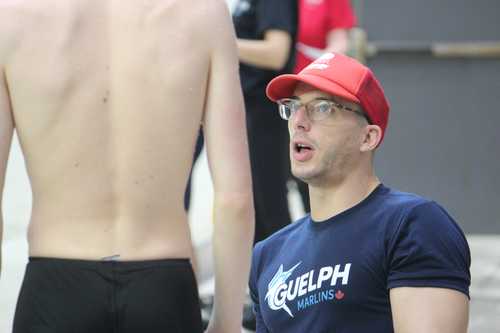
van der Merwe accepted a job, as a senior coach, with the Guelph Marlin Aquatic Club (GMAC). His focus is on swimmers between the ages of 15 and 18. High on his list is an opportunity, when that time comes, to coach a senior level athlete with physical disabilities.
Laura Nicholls, a two-time Olympian in the pool and head coach of the Marlins, interviewed van der Merwe three times before extending the invite to join her staff.
“He’s a great fit and the coach we had been looking for,” said Nicholls, whose club functions out of the University of Guelph and the municipality-operated Victor Davis Pool. “Passionate, knowledgeable in swim lingo, but more so (van der Merwe) wants to be successful as a coach, see the growth and development of swimmers and puts athletes first.”
GMAC has 190 competitive swimmers, 70 in the Master’s program, about 10 with disabilities and provides lessons to 1,000 people on an annual basis.
Let’s take a minute to return to van der Merwe’s swimming days and a personal goal of achieving success as an individual with a disability.
His biggest accomplishment – making it to the Paralympic Games. In the 100-metres breaststroke, at the 2020 event in in Tokyo, van der Merwe placed ninth. It wasn’t what some would call a masterpiece for the 29-year-old. For him, and that’s what counts, finishing in the Top 10 in the world is quite exceptional.
“I had qualified for the Paralympic Games in Beijing, London and Rio, but Tokyo is what I will always remember,” he said. “It took me 17 years to make the Paralympics – and the dream came true.”
Coaching entered his world, thanks to a special relationship with a friend in South Africa.
“I can remember that first time – and I fell in love with (coaching),” said van der Merwe who, for years, has gone by the moniker of “Coach Legs”, given to him by swimmers at a meet in Durban. “I’m told that, in Canada, it’s not politically correct to use that, but I am grateful that others, who gave it to me, thought of it meaning well.”
Talk to him about coaching and be prepared for a lengthy conversation.
“Coaching is my life,” said van der Merwe, one who does not shy away from hard work and long hours. “I don’t know what else I would do now that I’d enjoy. I just love seeing the journey of improvement. I look at human potential as being un-tapped. Success and growth don’t just happen.
“What I find to be very important, and respectful, is being straightforward with swimmers. I’m big on gratitude. If you have it, you’ll always be happy.”
Swim Ontario, Canada’s largest provincial swim organization, shines the spotlight on van der Merwe – and all coaches - during “National Coaches Week”. It’s a celebration of outstanding leadership, guidance and dedication to athletes.
On his right arm, van der Merwe has a tattoo with the words “if the only prayer in life you say is thank you, that would suffice”.
Living a life of integrity, that’s van der Merwe.
https://www.swimontario.com/news/2024-national-coaches-week-featurehendrikvandermerwe/
